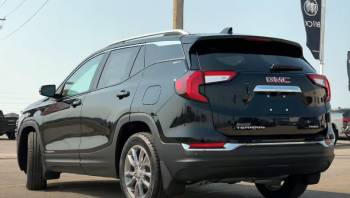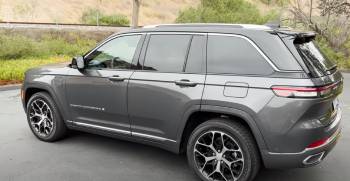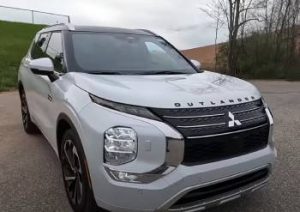When diving into the world of mid-size SUVs, two names consistently rise to the top: the GMC Terrain and the Jeep Cherokee. Both offer incredible value and have carved out a niche in a crowded market, but how do they stack up head-to-head?
Let’s take a closer look at these two powerhouse vehicles, analyze their key features, and uncover which might be the right fit for you.
A Brief Comparison Table
| Feature/Aspect | GMC Terrain | Jeep Cherokee |
| Brand Heritage | Luxury and utility | Ruggedness and off-road capability |
| Design Aesthetics | Sleek and urban | Rugged and adventurous |
| Performance | Efficient and balanced | Flexible with various engine options |
| Off-Road Ability | Suitable for occasional country roads | Designed for challenging terrains |
| Interior | Luxury-focused with soft-touch materials | Durable and practical with luxury touches |
| Price Point | Typically higher, especially with premium add-ons | Broad range, accessible to varied budgets |
The GMC Terrain: Where Luxury Meets Practicality

Pros:
- Sleek Design:
GMC Terrain’s body style is modern and polished, ensuring you’ll turn heads wherever you go.
- Technology Packed:
t boasts a user-friendly infotainment system, Apple CarPlay, and Android Auto compatibility.
- Fuel Efficiency:
It’s known to have commendable fuel efficiency for its class, saving you money at the pump.
- Spacious Interior:
With ample legroom and cargo space, it’s perfect for those longer trips or big shopping days.
Cons:
- Less Off-Road Capable:
Unlike its Jeep counterpart, the Terrain is not as rugged when it comes to off-road adventures.
- Price Point:
Typically, the Terrain can run a bit pricier than the Cherokee, especially with add-ons.
Also Read: Differences Between Pure Energy And Remy Alternators.
The Jeep Cherokee: A Blend of Tradition and Modernity

Pros:
- Off-Road Mastery:
Jeep’s legendary off-road capabilities shine in the Cherokee, making it perfect for adventurers.
- Engine Options:
Multiple engine choices mean you can opt for more power or better fuel efficiency.
- User-Friendly Tech:
Like the Terrain, the Cherokee offers Apple CarPlay and Android Auto.
- Towing Capacity:
The Cherokee typically offers a higher towing capacity, a plus for weekend warriors with trailers or boats.
Cons:
- Fuel Efficiency:
While not terrible, the Cherokee might not match the Terrain in terms of miles per gallon.
- Less Luxurious:
The Cherokee leans more towards rugged than luxurious, which might not appeal to everyone.
Choosing between the GMC Terrain and Jeep Cherokee boils down to personal preference and how you’ll use your SUV. If off-road adventures and towing are priorities, then the Cherokee might be your pick. But if you lean towards luxury, style, and city driving, the Terrain could be the SUV for you.
Key Differences Between GMC Terrain and Jeep Cherokee
The GMC Terrain and the Jeep Cherokee are both formidable contenders in the SUV arena. However, to the discerning eye and the informed consumer, they offer very distinct experiences. Let’s break down their key differences in detail.
- Brand Philosophy and Heritage
GMC Terrain: GMC, as a brand, leans towards a blend of luxury and utility. With the Terrain, GMC offers an SUV that embodies this spirit, presenting a polished and refined exterior, matched with an interior designed for comfort and a touch of opulence.
Jeep Cherokee: Jeep’s heritage is steeped in ruggedness and off-road capability. The Cherokee holds this flag high, being a vehicle that promises—and delivers—both on-road refinement and off-road prowess.
- Design Aesthetics
GMC Terrain: The Terrain is sleek, with sharp lines and an elegant finish. Its aesthetic is decidedly urban, making it fit seamlessly in both city landscapes and suburban driveways.
Jeep Cherokee: The Cherokee, while modern, holds onto its rugged roots with a boxier design, a seven-slot grille, and a stance that looks ready for adventure.
- Performance and Engine Options
GMC Terrain: GMC Terrain tends to focus more on efficiency and a balanced ride. While it might not have the brawnier engine options of the Cherokee, it compensates with better fuel economy.
Jeep Cherokee: Jeep provides a range of engine options for the Cherokee, some of which are designed for those craving power and performance. This flexibility allows the Cherokee to cater to both daily commuters and those looking for a bit of adventure on weekends.
- Off-Road Capabilities
GMC Terrain: While the Terrain can handle rougher terrains (no pun intended), it’s not designed with heavy off-roading in mind. Its capabilities are more attuned to city streets and occasional country roads.
Jeep Cherokee: The Cherokee shines in this department. Especially the Trailhawk variant, which comes with additional off-road features, ensuring the vehicle can tackle a variety of challenging terrains.
- Interior Features and Comfort
GMC Terrain: Terrain’s interior is about luxury. Soft-touch materials, intuitive infotainment systems, and noise-reducing features make it a haven for those who prioritize comfort.
Jeep Cherokee: While the Cherokee offers a comfortable ride, its interiors are a mix of luxury and practicality. It provides durable materials designed to withstand the wear and tear of adventurous outings.
- Price Point and Value
GMC Terrain: Generally, the Terrain is priced slightly higher, especially when adding on premium features. However, for those who value luxury touches, it offers great value for money.
Jeep Cherokee: The Cherokee offers a broader range of pricing options, thanks to its variety of trims. This flexibility can make it more accessible to a wider range of budgets.
Also Read: Differences Between Diesel Pro And Stealth Modules.
Frequently Asked Questions (FAQ)
The GMC Terrain, while spacious and modern, is generally considered more compact than the Jeep Grand Cherokee. The Grand Cherokee is larger, offers more power, and is built for more rugged activities. If you’re after luxury and practical city driving, Terrain is your go-to. But for more power and off-road capabilities, Grand Cherokee is the choice.
“Better” is subjective. Jeep is renowned for its off-road prowess, while GMC is known for blending luxury with practicality. Your needs and preferences will determine the better choice for you.
No, the GMC Terrain is smaller than the Jeep Grand Cherokee. The Grand Cherokee is more in line with larger SUVs, while the Terrain aligns with compact SUVs.
In general, the base prices of GMC models like the Terrain tend to be a bit higher than Jeep models like the Cherokee. However, final prices can vary based on added features, location, and dealership promotions.
Absolutely! GMC Terrains are known for their blend of luxury, technology, and practicality. They are particularly well-suited for urban and suburban drivers.
This depends on your needs. The Jeep Cherokee Trailhawk, for instance, is tailored for off-road use, while the Limited trim offers more luxury features. Research the different trims to find the one that’s perfect for you.
In Conclusion:
The GMC Terrain and Jeep Cherokee, while both being SUVs, cater to different audiences and lifestyles. Your choice between the two should hinge on your priorities—whether it’s luxury, efficiency, ruggedness, or flexibility. Both vehicles, in their respective domains, promise a stellar driving experience.
Both the GMC Terrain and Jeep Cherokee are stellar SUVs with their own sets of advantages. By analyzing your priorities and needs, you’ll undoubtedly find the SUV that’s a perfect match for your lifestyle. Safe driving!



